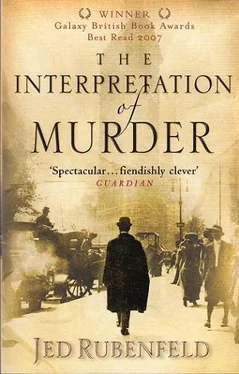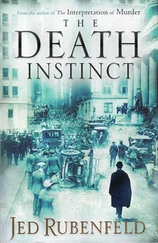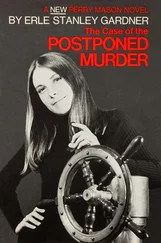Jed Rubenfeld - The Interpretation of Murder
Здесь есть возможность читать онлайн «Jed Rubenfeld - The Interpretation of Murder» весь текст электронной книги совершенно бесплатно (целиком полную версию без сокращений). В некоторых случаях можно слушать аудио, скачать через торрент в формате fb2 и присутствует краткое содержание. Жанр: Исторические приключения, на английском языке. Описание произведения, (предисловие) а так же отзывы посетителей доступны на портале библиотеки ЛибКат.
- Название:The Interpretation of Murder
- Автор:
- Жанр:
- Год:неизвестен
- ISBN:нет данных
- Рейтинг книги:5 / 5. Голосов: 1
-
Избранное:Добавить в избранное
- Отзывы:
-
Ваша оценка:
- 100
- 1
- 2
- 3
- 4
- 5
The Interpretation of Murder: краткое содержание, описание и аннотация
Предлагаем к чтению аннотацию, описание, краткое содержание или предисловие (зависит от того, что написал сам автор книги «The Interpretation of Murder»). Если вы не нашли необходимую информацию о книге — напишите в комментариях, мы постараемся отыскать её.
The Interpretation of Murder — читать онлайн бесплатно полную книгу (весь текст) целиком
Ниже представлен текст книги, разбитый по страницам. Система сохранения места последней прочитанной страницы, позволяет с удобством читать онлайн бесплатно книгу «The Interpretation of Murder», без необходимости каждый раз заново искать на чём Вы остановились. Поставьте закладку, и сможете в любой момент перейти на страницу, на которой закончили чтение.
Интервал:
Закладка:
The coroner had brought his old, bulky box camera with him. This he now put to use, replacing the exposed plate with a fresh one after each smoky detonation of his flashlight. Banwell remarked that if the pictures made their way to the Herald, the coroner could be sure he would never be employed in New York or anywhere else again. Hugel did not reply; at that moment a strange whine began to fill the room, like the quiet cry of a violin stretched to its highest note. It seemed to have no source, coming from everywhere and nowhere at once. It rose louder and louder, until it became almost a wail. The maid screamed. When she finished, there was no sound in the room at all.
Mr Banwell broke the silence. 'What the devil was that?' he asked the manager.
'I don't know, sir,' replied the manager. 'It's not the first time. Perhaps some settling in the walls?'
'Well, find out,' said Banwell.
When the coroner finished his photography, he announced he was leaving and taking the body with him. He had no intention of questioning the help or the neighboring residents — which was not his job — or of waiting for Detective Littlemore. In this heat, he explained, decomposition would rapidly set in if the corpse was not refrigerated at once. With the assistance of two elevator men, the girl's body was taken down to the basement in a freight elevator and from there to a back alley, where the coroner's driver was waiting.
When, two hours later, Detective Jimmy Littlemore arrived — not in uniform — he was flummoxed. It had taken some time for the mayor's messenger boys to find Littlemore; the detective had been in the basement of the new police headquarters still under construction on Centre Street, trying out the pistol range. Littlemore's orders were to make a thorough inspection of the murder scene. Not only did he find no murder scene, he found no murderee. Mr Banwell would not speak with him. The staff also proved surprisingly untalkative.
And there was one person whom Detective Littlemore did not even get a chance to interview: the maid who had found the body. After Coroner Hugel left but before the detective arrived, the manager had called the young woman to his office and handed her an envelope with her month's pay — minus one day, of course, since it was only August 30. He informed the girl he was letting her go. 'I'm sorry, Betty,' he said to her. 'I'm really sorry.'
Before anyone else was up, I examined the Monday morning newspapers in the opulent rotunda of the Hotel Manhattan, where Clark University was housing Freud, Jung, Ferenczi, and myself for the week. (Brill, who lived in New York, did not require a room.) Not one of the papers carried a story about Freud or his upcoming lectures at Clark. Only the New Yorker Staats-Zeitung ran anything at all, and this was a notice announcing the arrival of a 'Dr Freund from Vienna.'
I never intended to be a doctor. It was my father's wish, and his wishes were supposed to be our commands. When I was eighteen and still living in my parents' house in Boston, I told him I was going to be America's foremost scholar of Shakespeare. I could be America's hindmost scholar of Shakespeare, he replied, but fore or hind, if I did not intend to pursue a career in medicine, I would have to find my own means of paying Harvard's tuition.
His threat had no effect on me. I didn't care at all for the family's Harvardiana, and I would be happy, I told my father, to complete my education elsewhere. This was the last conversation of any length I ever had with him.
Ironically, I was to obey my father's wish only after he no longer had any money to withhold from me. The collapse of Colonel Winslow's banking house in November 1903 was nothing compared to the panic in New York four years later, but it was good enough for my father. He lost everything, including my mother's bit. His face aged ten years in a single night; deep creases appeared unannounced on his brow. My mother said I must take pity on him, but I never did. At his funeral — which compassionate Boston avoided in droves — I knew for the first time I would go on in medicine, if able to continue my studies at all. Whether it was a newfound practicality that drove my decision or something else, I hesitate to say.
It was I, as things fell out, on whom pity had to be taken, and Harvard that took it. After my father's funeral, I notified the university that I would be withdrawing at year's end, the two-hundred-dollar tuition being now far beyond my means. President Eliot, however, waived the fee. Probably he concluded that Harvard's long-term interests would be better served not by giving the boot to the third Stratham Younger to trudge through the Yard, but by forgiving the demi-orphan his tuition in expectation of future rewards. Whatever the motivation, I will be forever grateful to Harvard for letting me stay on.
Only at Harvard could I have attended Professor Putnam's famous lectures on neurology. I was a medical student by then, having won a scholarship, but was proving an uninspired doctor-to-be. One spring morning, in an otherwise dust-dry account of nervous diseases, Putnam referred to Sigmund Freud's 'sexual theory' as the only interesting work being done on the subject of the hysterical and obsessional neuroses. After class, I asked for readings. Putnam pointed me to Havelock Ellis, who accepted Freud's two most radical discoveries: the existence of what Freud called 'the unconscious' and the sexual aetiology of neurosis. Putnam also introduced me to Morton Prince, who was then just starting his journal on abnormal psychology. Dr Prince had an extensive collection of foreign publications; it turned out he had known my father. Prince took me on as a proofreader. Through him, I got my hands on almost everything Freud had published, from The Interpretation of Dreams to the groundbreaking Three Essays. My German was good, and I found myself consuming Freud's work with an avidity I had not felt for years. Freud's erudition was breathtaking. His writing was like filigree. His ideas, if correct, would change the world.
The hook was sunk for good, however, when I came across Freud's solution to Hamlet. It was, for Freud, a throw- away, a two-hundred-word digression in the middle of his treatise on dreams. Yet there it was: a brand-new answer to the most famous riddle in Western literature.
Shakespeare's Hamlet has been performed thousands upon thousands of times, more than any other play in any language. It is the most written-about work in all of literature. (I do not count the Bible, of course.) Yet there is a strange void or vacuum at the core of the drama: all the action is founded on the inability of its hero to act. The play consists of a series of evasions and excuses seized on by the melancholy Hamlet to justify postponing his revenge on his father's murderer (his uncle, Claudius, now King of Denmark and wed to Hamlet's mother), punctuated by anguished soliloquies in which he vilifies himself for his own paralysis, the most famous of them all beginning, of course, To be. Only after his delays and missteps have brought about ruin — Ophelia's suicide; the murder of his mother, who drinks a poison Claudius prepared for Hamlet; and his own receipt of a fatal cut from Laertes' envenomed sword — does Hamlet at last, in the play's final scene, take his uncle's triply forfeited life.
Why doesn't Hamlet act? Not for lack of opportunity: Shakespeare gives Hamlet the most propitious possible circumstances for killing Claudius. Hamlet even acknowledges this (Now might I do it), yet still he turns away. What stops him? And why should this inexplicable faltering — this seeming weakness, this almost cowardice — be capable of riveting audiences around the world for three centuries? The greatest literary minds of our era, Goethe and Coleridge, tried but failed to pull the sword from this stone, and hundreds of lesser lights have broken their heads on it.
Читать дальшеИнтервал:
Закладка:
Похожие книги на «The Interpretation of Murder»
Представляем Вашему вниманию похожие книги на «The Interpretation of Murder» списком для выбора. Мы отобрали схожую по названию и смыслу литературу в надежде предоставить читателям больше вариантов отыскать новые, интересные, ещё непрочитанные произведения.
Обсуждение, отзывы о книге «The Interpretation of Murder» и просто собственные мнения читателей. Оставьте ваши комментарии, напишите, что Вы думаете о произведении, его смысле или главных героях. Укажите что конкретно понравилось, а что нет, и почему Вы так считаете.












